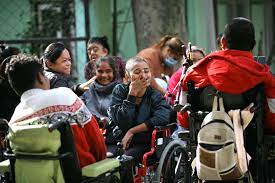OVERCOMING THE DAILY STRUGGLES FACED BY PERSONS WITH DISABILITIES
Persons with disabilities in Nepal face various challenges that can be broadly categorized
into social, economic, educational, and infrastructural barriers. While progress has been
made in recent years to address these challenges, there is still work to be done to ensure
inclusivity and equal opportunities for persons with disabilities. Here are some key
challenges faced by persons with disabilities in the context of Nepal:
- Limited Accessibility: One of the primary challenges faced by persons with disabilities in
Nepal is the limited accessibility to public spaces, infrastructure, and transportation. The
rugged terrain and lack of proper infrastructure make it difficult for persons with disabilities
to navigate through cities and rural areas alike. Public buildings, transportation systems,
and even public restrooms often lack the necessary accommodations, excluding many from
participating in daily life.
- Educational Barriers: While there have been efforts to improve educational opportunities
for persons with disabilities in Nepal, significant barriers persist. Limited resources,
inaccessible facilities, and a lack of trained educators create hurdles for disabled students.
Additionally, societal stigmas surrounding disability can result in isolation and discrimination,
making it challenging for students to thrive in an inclusive learning environment.
Employment Disparities: The job market in Nepal presents another formidable challenge
for persons with disabilities. Despite legal provisions that mandate a certain percentage of
job opportunities for persons with disabilities, the implementation remains inadequate.
Discrimination, lack of reasonable accommodations, and misconceptions about the
capabilities of persons with disabilities contribute to high unemployment rates among this
population.
- Social Stigma: Deep-seated cultural beliefs and social stigmas surrounding disability
persist in Nepalese society. Persons with disabilities often face exclusion, prejudice, and pity,
which can have detrimental effects on their mental well-being and self-esteem. Changing
these perceptions and fostering a culture of acceptance is crucial for creating an inclusive
society.
- Healthcare Disparities: Access to proper healthcare is a fundamental right that many
disabled individuals in Nepal struggle to obtain. Limited availability of specialized healthcare
facilities and a lack of trained professionals contribute to inadequate healthcare services for
persons with disabilities. This issue is further exacerbated in rural areas where medical
resources are scarce.
- Natural Disasters and Vulnerability: Nepal is prone to natural disasters such as
earthquakes, floods, and landslides. Persons with disabilities are especially vulnerable during
such events due to their limited mobility and difficulty accessing emergency services.
Disaster preparedness and response strategies need to be inclusive to ensure the safety and
well-being of disabled individuals.
- Legal Framework Implementation: While Nepal has enacted legislation to protect the
rights of individuals with disabilities, effective implementation remains a challenge. Limited
awareness, bureaucratic inefficiencies, and gaps in the legal framework hinder the
enforcement of these rights, leaving many persons with disabilities without the protection
and support they are entitled to.
- Limited Access to Assistive Devices: Many persons with disabilities lack access to
assistive devices and technologies that could enhance their independence and quality of life.
Communication Barriers: Limited availability of sign language interpretation and other
communication support services creates barriers for persons with hearing or speech
impairments, hindering their ability to access information and communicate effectively.
Addressing the challenges faced by persons with disabilities in Nepal requires a multi-
faceted approach that encompasses changes in societal attitudes, improvements in
infrastructure, and effective implementation of existing legal frameworks. Collaboration
between the government, non-governmental organizations, and the community is crucial for
creating an inclusive environment that empowers individuals with disabilities to live fulfilling
lives. Only through concerted efforts can Nepal transform into a society that values and
accommodates the diverse abilities of all its citizens.
Efforts are being made by both governmental and non-governmental organizations to
address these challenges and promote inclusivity for persons with disabilities in Nepal.
However, sustained efforts and awareness campaigns are crucial to bring about lasting
change.



Comments
Post a Comment